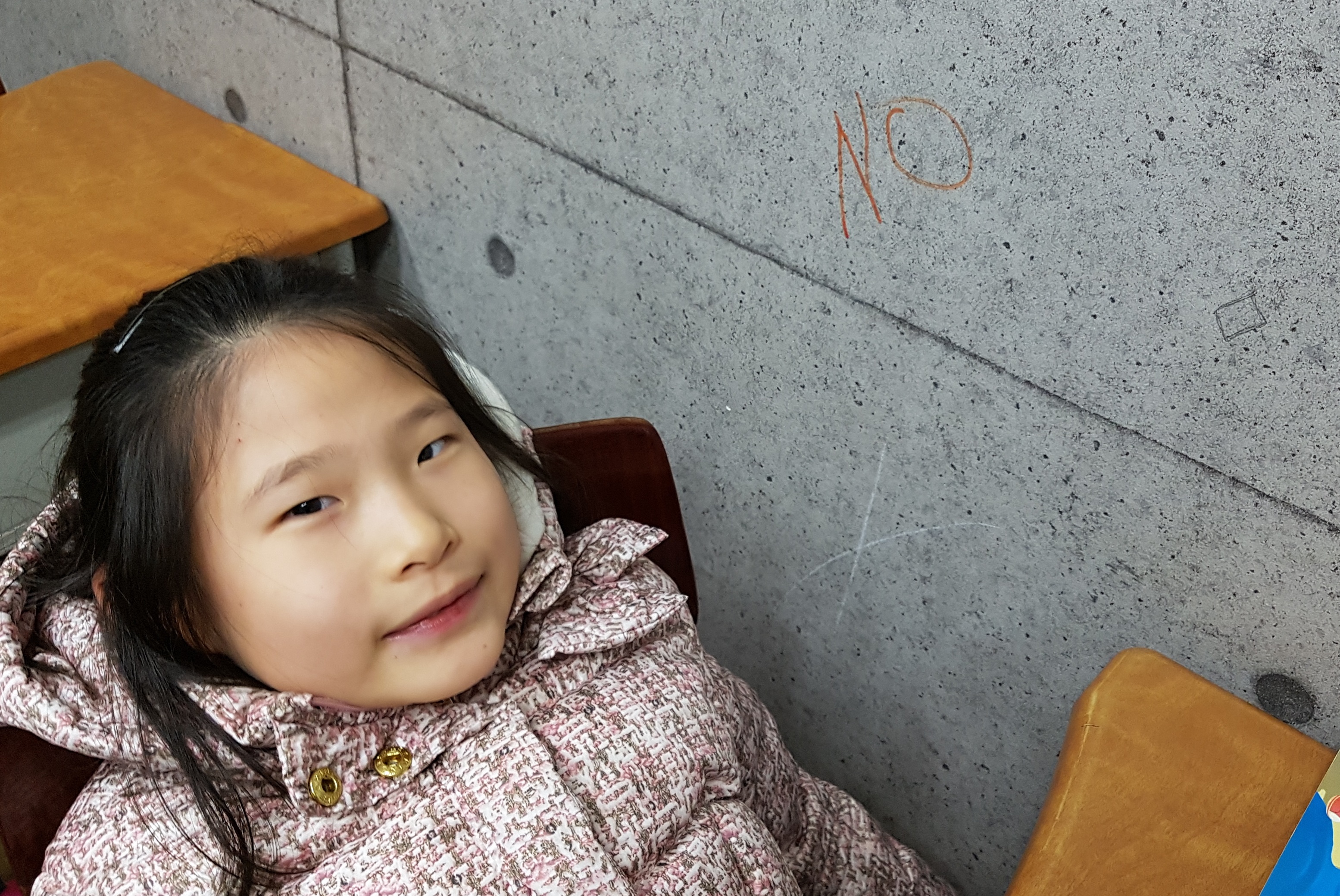I have an elementary 2nd grade student who goes by the English name of Alisha. She is a bit behind her peers in social development, with a lot of pre-elementary age behavior (i.e. “babyish” or young for her age), but she is plenty smart. She doesn’t really know what to make of my “alligator bucks” – the “dollars” I give to students as a kind of reward points system. She destroys them systematically, when she receives them, rather than saving them like other students do. But she derives a great deal of pleasure from destroying them, so perhaps they still serve as a kind of reward.
She has pretty good comprehension of my English output. She’s good at following instructions, and has a recognition vocabulary higher than some of her peers in the same class. On the other hand, she mostly never writes anything using English letters. She “sounds out” the English words she wants to write using the Korean alphabet, hence her name 알리샤 [allisya], or 캣 [kaet = “cat”], etc. And even her hangul is full of misspellings and variants from Korean orthography. She suffers some substantial dyslexia – she cannot differentiate ‘d’ and ‘b’, and I’ve seen her writing hangul with reversed glyphs, too.
She also is quite defiant, at times. She will refuse to answer questions. But mostly, she simply doesn’t talk at all – in Korean or English. She gestures and has a very expressive face, to compensate.
On Monday, she was more talkative than usual. “No no no no no” she announced, upon entering the classroom. Later, when we were doing flashcards, she described each card as “No.” I appreciated the English, but was a little bit frustrated by the defiance. I turned the card so I could see it – a cat – and said, “That’s not a ‘no’, is it?”
“No,” she agreed.
OK, that was a badly phrased question, wasn’t it?
“What is it?” I tried again. She shook her head, and tried a different type of defiance. She waved her hand, with a kind of stop-motion style, and said, firmly and with excellent intonation, “Bye!”
I moved on to other students, who get impatient when I spend too much time with Alisha. Later, it was back to “No.”
But then, we took our quiz. Often, on quizzes, she leaves her paper blank, or just scribbles on it. Other times, she’ll diligently transcribe all the words in hangul. Without direct supervision and letter-by-letter guidance, she will almost never write a word in English letters.
On Monday, she wrote, using a fat orange marker she’d taken from my basket:
- No
- No
- No
- …
I was impressed. “Wow, you’re writing English! That’s excellent,” I praised. Small steps, right? I gave her an alligator dollar, which she promptly began to gleefully destroy, peeling off the laminated backing.
Then she pointed proudly at the wall. There, in large, orange-colored letters, she’d also written “No.”
“Oh, well… ” I was so torn. On the one hand, I was happy with her finally expressing her sincere feelings in English letters. It was, truly, her first such success. On the other hand, I felt that doing so on the classroom wall was problematic. I ran from the room and fetched a bottle of spray cleaner.
“I am so happy you’re writing English letters. There’s ‘N’, there’s ‘O’… ‘no.’ Great job. But we need to clean that up. No writing on the wall, OK? 그렇게 하지마 [don’t do like that],” I said, gesturing at the wall and shaking my head.
I paused and took a picture, to document the event. I knew this would end up in my blog.

“OK!” she said, grinning.
“Let’s clean that up,” I urged. The other kids were feeling entertained by all this, so I wasn’t too worried about them. I let her wield the spray cleaner bottle against the wall, and we tried to clean up the word. Now there’s a white stain on the wall.
The problem was mostly resolved. Several times more during the class, she sad “No,” but she also said several other words, including “car” and “cat.” And she wrote “alligator” at the bottom of her quiz paper – copying the word from the board, where that particular word is always written, for my lowest-level classes. Given how much I use alligators as a kind of mascot in my classes, kids often feel a need to write this long, difficult word.
On Wednesday (yesterday), Alisha went up to another teacher, Helen, before class started. Apparently, in Korean, she whispered to Helen, emphatically, that she really liked her phonics class with Jared. Helen reported this to me. Helen asked me what I’d done to earn her endorsement. I really have no idea. Perhaps just trying to validate her efforts? Not exploding in anger and violence at her writing on the wall?
[daily log: walking, 7km]
